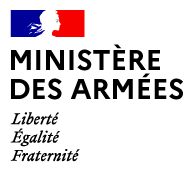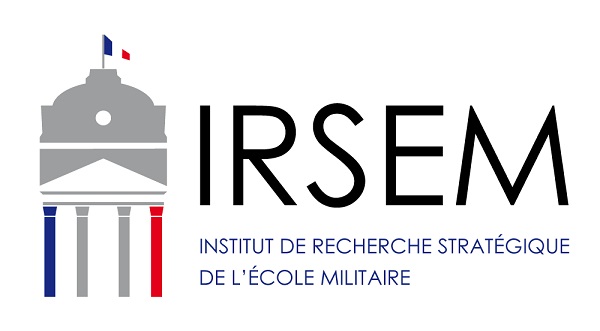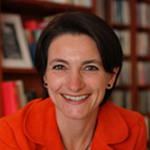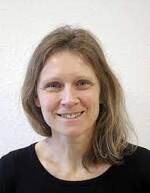IRSEM's Academic Advisory Council
The role of the Academic Advisory Council is set out along the lines of the order on the framework of the IRSEM. As mentioned, the Academic Advisory Council, “proposes research themes; communicates on the scientific program of the institute and on the outreach and partnership policy; formulates opinions on the scientific quality of work submitted by the Institute management; and is to be consulted for awarding of prizes and research grants”.
According to the ministerial order, the Scientific council is said to gather, “10 qualified individuals recognised for their scientific competencies, appointed by the decision of the Defence Minister, on the proposal of the Director of the institute, for a period of 3 years and renewable once”.
→ See the ministerial order of 01/02/2017 which appoints the following 8 non-resident experts. Following the recent April 2021 amendment, 2 additional members will be appointed soon:
Professor Philippe Boulanger (FRA, geography, University of Paris-Sorbonne)
 Professor Boulanger holds a “agrégation”, France’s highest Diploma of Education, as well as a PhD in Geography. He is currently teaching at Sorbonne University and is a member of the Administration Council of the Société de Géographie in Paris. He has previously participated in the 47th session of the "Armament and Economy of Defence" program at the IHEDN. Furthermore, he has subsequently held academic positions, such as Director of the Geography Department of University Paris-4 Sorbonne in Abu Dhabi (2006-2009), Associate Professor at Sorbonne University (2000-2010) and member of the National Council of Universities (2003-2007). Professor Boulanger also teaches a seminar on military geography, in which he specialises in, at the Department of Geography at the Ecole Normale Supérieure in Paris.
Professor Boulanger holds a “agrégation”, France’s highest Diploma of Education, as well as a PhD in Geography. He is currently teaching at Sorbonne University and is a member of the Administration Council of the Société de Géographie in Paris. He has previously participated in the 47th session of the "Armament and Economy of Defence" program at the IHEDN. Furthermore, he has subsequently held academic positions, such as Director of the Geography Department of University Paris-4 Sorbonne in Abu Dhabi (2006-2009), Associate Professor at Sorbonne University (2000-2010) and member of the National Council of Universities (2003-2007). Professor Boulanger also teaches a seminar on military geography, in which he specialises in, at the Department of Geography at the Ecole Normale Supérieure in Paris.
Professor Fanny Coulomb (FRA, senior lecturer, Sciences Po Grenoble).
 Fanny Coulomb is a lecturer at Sciences Po Grenoble. She teaches mainly economic theory and defense economics.
Fanny Coulomb is a lecturer at Sciences Po Grenoble. She teaches mainly economic theory and defense economics.
Professor Olivier Forcade (FRA, historian, Université Paris-IV Sorbonne)
 Professor Olivier Forcade holds an agrégation and a doctorate in history, and is a university professor and vice-president of the University of Paris-4 Sorbonne. Previously lecturer and then professor at the University of Picardie Jules Verne (2002-2008), lecturer at Sciences Po (1993-2005) and professor at the Saint-Cyr military academy (1991-2002), he works on the contemporary history of international relations, and of intelligence in particular. A former member of the Scientific Council for Historical Research in Defense and of the 1914-1918 Centennial Mission, he was awarded the Bronze Medal of National Defense and is a Chevalier des Palmes Académiques.
Professor Olivier Forcade holds an agrégation and a doctorate in history, and is a university professor and vice-president of the University of Paris-4 Sorbonne. Previously lecturer and then professor at the University of Picardie Jules Verne (2002-2008), lecturer at Sciences Po (1993-2005) and professor at the Saint-Cyr military academy (1991-2002), he works on the contemporary history of international relations, and of intelligence in particular. A former member of the Scientific Council for Historical Research in Defense and of the 1914-1918 Centennial Mission, he was awarded the Bronze Medal of National Defense and is a Chevalier des Palmes Académiques.
Professor Beatrice Heuser (DEU, historian and political scientist, University of Reading, UK)
A historian by training, Professor Heuser holds a PhD in political science from Oxford University and a PhD from the University of Marburg. She is Professor and Chair of International Relations at the University of Reading in the UK. Previously Director of Research at the German Historical Defense Service in Potsdam (Militärgeschichtliches Forschungsamt), Professor of Strategic Studies at the Department of War Studies at King's College London (1991-2003), she has also worked for the Royal Institute of International Affairs (RUSI), the French and British Ministries of Defense and the European Commission.
Professor Thomas Lindemann (DEU, political scientist, Ecole Polytechnique / Université de Versailles Saint-Quentin)
 Professor Lindemann holds an agrégation and a doctorate in political science, and is a professor at the University of Versailles Saint-Quentin and at the Ecole Polytechnique, after having been a professor at the University of Artois (2008-2013) and the University of Bordeaux IV (2005-2008), and a lecturer at the University of Toulouse-1 (1998-2005). An elected member of the CNRS Section 40 National Committee and the Board of Directors of the French Political Science Association, and a visiting professor at Columbia University in New York in the fall 2016 term, he is a specialist in the theory of war (constructivism, causes of war, philosophy of recognition).
Professor Lindemann holds an agrégation and a doctorate in political science, and is a professor at the University of Versailles Saint-Quentin and at the Ecole Polytechnique, after having been a professor at the University of Artois (2008-2013) and the University of Bordeaux IV (2005-2008), and a lecturer at the University of Toulouse-1 (1998-2005). An elected member of the CNRS Section 40 National Committee and the Board of Directors of the French Political Science Association, and a visiting professor at Columbia University in New York in the fall 2016 term, he is a specialist in the theory of war (constructivism, causes of war, philosophy of recognition).
Olivier Schmitt (FRA, political scientist, Université du Sud-Danemark)
 Olivier Schmitt is Professor of Political Science at the Center for War Studies, University of Southern Denmark. He is a founding member of the Association for the Study of War and Strategy (AEGES), of which he was vice-president and scientific director, and a member of the European Initiative for Security Studies (EISS). A reserve officer in the French Navy, he has worked for two think tanks: the Geneva Centre for the Democratic Control of Armed Forces (DCAF) and the International Institute for Strategic Studies (IISS). His research interests include strategic and security studies, multilateral military cooperation, comparative defense policy, arms control, the changing nature of war, influence and propaganda, and extreme right-wing ideologies. His main research project is entitled "Transforming Armed Forces in the 21st Century" funded by the Carlsberg Foundation and the Gerda Henkel Foundation. He is the author of La RFA et la Politique Européenne de Sécurité et de Défense (L'Harmattan, 2009) and Allies that Count. Junior Partners in Coalition Warfare (Georgetown University Press, 2018). He has published in International Affairs, European Journal of International Relations, Contemporary Security Policy, Cooperation and Conflict, Journal of Strategic Studies, International Politics Reviews, European Security, Revue Française de Science Politique.
Olivier Schmitt is Professor of Political Science at the Center for War Studies, University of Southern Denmark. He is a founding member of the Association for the Study of War and Strategy (AEGES), of which he was vice-president and scientific director, and a member of the European Initiative for Security Studies (EISS). A reserve officer in the French Navy, he has worked for two think tanks: the Geneva Centre for the Democratic Control of Armed Forces (DCAF) and the International Institute for Strategic Studies (IISS). His research interests include strategic and security studies, multilateral military cooperation, comparative defense policy, arms control, the changing nature of war, influence and propaganda, and extreme right-wing ideologies. His main research project is entitled "Transforming Armed Forces in the 21st Century" funded by the Carlsberg Foundation and the Gerda Henkel Foundation. He is the author of La RFA et la Politique Européenne de Sécurité et de Défense (L'Harmattan, 2009) and Allies that Count. Junior Partners in Coalition Warfare (Georgetown University Press, 2018). He has published in International Affairs, European Journal of International Relations, Contemporary Security Policy, Cooperation and Conflict, Journal of Strategic Studies, International Politics Reviews, European Security, Revue Française de Science Politique.
Catherine Tessier (FRA, research director, ONERA)
Anne-Marie Tournepiche (FRA, public law, Université de Bordeaux)
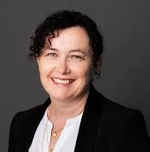 Anne-Marie Tournepiche is a professor of public law at the University of Bordeaux since 2011. Her research fields are mainly international and European law, in particular refugee law and armed conflicts.
Anne-Marie Tournepiche is a professor of public law at the University of Bordeaux since 2011. Her research fields are mainly international and European law, in particular refugee law and armed conflicts.
Claude Weber (FRA, sociologist, Ecoles militaires de Saint-Cyr)
 Doctorate in social sciences with a major in ethnology and is a lecturer in sociology at the Ecoles militaires de Saint-Cyr, director of the sociology department, and a researcher at the Centre interdisciplinaire d'analyse des processus humains et sociaux at the University of Rennes-2. He is the head of Working Group 05 "Armed Forces and Societies" of the International Association of French-speaking Sociologists and a member of the board of the Thematic Network 08 "Sociology of the Military: Security, Armies and Society" of the French Sociology Association.
Doctorate in social sciences with a major in ethnology and is a lecturer in sociology at the Ecoles militaires de Saint-Cyr, director of the sociology department, and a researcher at the Centre interdisciplinaire d'analyse des processus humains et sociaux at the University of Rennes-2. He is the head of Working Group 05 "Armed Forces and Societies" of the International Association of French-speaking Sociologists and a member of the board of the Thematic Network 08 "Sociology of the Military: Security, Armies and Society" of the French Sociology Association.
